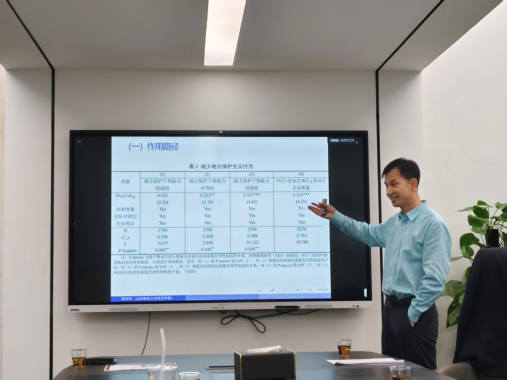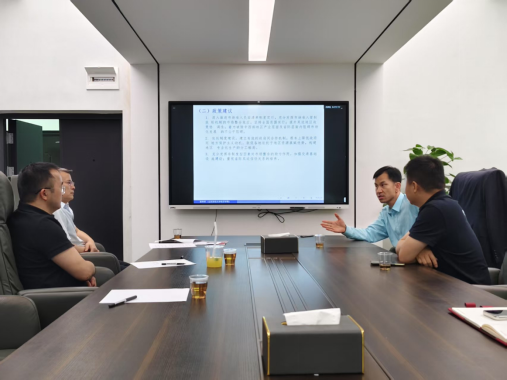(Correspondent Gao Yifei) On April 30, 2025, an academic conference was co-hosted by the Center for International Cooperation and Disciplinary Innovation of Income Distribution and Public Finance (111 Center) and the School of Public Finance and Taxation, both at Zhongnan University of Economics and Law (ZUEL). The event took place in Conference Room 119 of the Wenqin Building. Professor Xie Shenxiang, the keynote speaker of this academic forum, delivered a keynote speech entitled "Market Integration Effect of Institutional Opening Up." The academic forum was hosted by Zhang Kezhong, Deputy Director of the 111 Center, and attended by more than ten people, including Lu Yuanping, Executive Director of the 111 Center, and research fellows Wan Xin, Zhao Ying, Liu Erpeng, and Tian Binbin.

In the beginning, Zhang Kezhong introduced Professor Xie Shenxiang's representative research achievements in international economy, finance, and taxation. Then, based on the pilot policy of a negative list for market access, Professor Xie Shenxiang explained his research results obtained through quasi-natural experimental methods around the impact mechanism of institutional opening up on market integration.

Professor Xie Shenxiang pointed out that traditional opening up focuses on "border measures" such as tariffs. In contrast, institutional opening up deepens reform through "domestic measures" such as rules, regulations, and standards. Its core lies in breaking local protectionism, optimizing resource allocation, and promoting the construction of a unified national market. Professor Xie Shenxiang furthered his analysis, with the pilot of the negative list for market access as an example. He said that the system has significantly promoted inter-provincial market integration by constraining local government intervention and reducing cross-regional investment costs for enterprises. Its effect is particularly prominent in Eastern China.
Following the above findings, Professor Xie Shenxiang put forward three policy proposals: first, deepening institutional opening up and promoting the implementation of the negative list system across China, especially breaking down administrative barriers in China's central and western regions. Second, optimizing the regional division of industries and establishing a differentiated industrial layout to avoid homogeneous competition. Third, strengthening basic support and cultivating the endogenous driving force of market integration by improving transportation infrastructure, building a regional trust mechanism, and promoting the cross-regional flow of innovation factors.

Professor Xie Shenxiang analyzed the realistic path of institutional opening up for the participants through detailed data and cases. In the discussion session, in response to the "challenges of institutional opening up under China-US trade frictions," Professor Xie Shenxiang emphasized that China is building a new pattern of opening up through the "dual circulation" strategy: expanding "Belt and Road" cooperation externally, deepening market-oriented reforms of factors internally, and paying special attention to income distribution and social security system optimization to release domestic demand potential. The faculty members and students at the meeting discussed the practical transformation of institutional opening-up policy theory.
Guest Profile
Xie Shenxiang, PhD in Economics, doctoral supervisor, postdoctoral co-supervisor, Deputy Secretary of the CPC Committee of Shandong University of Finance and Economics, professor of the School of Economics, Shandong University of Finance and Economics. He is an expert enjoying the special government allowance of the State Council, a leading talent in philosophy and social sciences under the National High-level Personnel Special Support Program, a recognized figure in the National Cultural Masters & "Four First Batches" Program, and an evaluation expert of the National Social Science Fund of China.
He has been engaged in research on international economy, fiscal and taxation policies, and industrial organization theory for a long time. He has published over 100 papers in Social Sciences in China, Economic Research Journal, Journal of Management World, The Journal of World Economy, China Economic Quarterly, China Economic Review, and Journal of Asian Economics. Many of his papers have been reprinted in full by Xinhua Digest, Chinese Social Science Digest, RUC Information Center for Social Science, and other mainstream media. He has presided over over 10 major key projects of the National Social Science Fund of China, the National Natural Science Foundation of China, and the Ministry of Education's Humanities and Social Sciences Planning Project. Besides, he has won one special prize and five first prizes for Outstanding Social Science Achievements of Shandong Province, two T.K.ANN International Trade Awards, and one special prize and one first prize for Teaching Achievements of Shandong Province.
He is also the Vice Chairman of the Shandong Federation of Social Sciences, Executive Director and Deputy Secretary-general of the China Society of World Economics, Executive Director of the Chinese Association of Quantitative Economics, Vice President of the Shandong Society of World Economics, and editorial board member of academic journals such as The Journal of Quantitative & Technical Economics.
